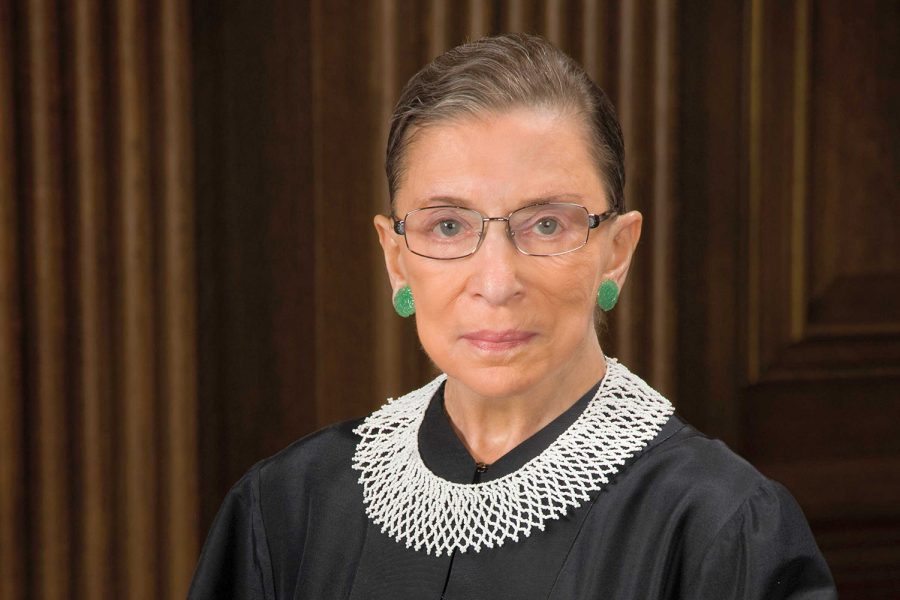Supreme Court Justice Ruth Bader Ginsburg dies at 87
Photo credit: Wikipedia Commons
Supreme Court Justice Ruth Bader Ginsburg served on the supreme court from 1993 fighting for progressive votes and laws including gender discrimination and same-sex marriage. Ginsburg died in her home in Washington D.C. on Friday, Sept. 18 due to complications from pancreatic cancer.
September 20, 2020
United States Supreme Court Justice and women’s rights activist Ruth Bader Ginsburg died on Friday in her home in Washington D.C. at the age of 87. Her death was due to complications of metastatic pancreas cancer. Ginsburg had fought five rounds of cancer over two decades.
Ginsburg began her career by obtaining her bachelor’s, and finishing first in her class, from Cornell University in 1954 and married Martin D. Ginsburg, also a law student, in the same year. She then attended law school at Harvard University where she was one of eight women in a class of 500. Ginsburg became the first female member of the legal journal, the Harvard Law Review.
“I’ve idolized [Ginsburg] since I can remember,” Archer senior Gracey Wyles said. “She taught me how to fight. She taught me what a woman should do and what a woman should be and that being a woman doesn’t mean you don’t deserve to have a voice in every single place. Seeing her lead by example has influenced me to help others do the same and know that my voice deserves to be everywhere.”
Ginsburg became Columbia University‘s first female tenured professor teaching from 1972-1980. Throughout the 1970’s, Ginsburg served as the director of the Women’s Rights Project of the American Civil Liberties Union (ACLU) leading the ACLU in multiple legal battles surrounding gender discrimination. Ginsburg argued six leading cases on gender inequality before the U.S. Supreme Court, including striking down Virginia Military Institute’s (VMI) male-only admissions policy as violating the Equal Protection Clause of the Fourteenth Amendment.
“Seeing someone lead by example and knowing that you can start off anywhere and end up in incredible places, so long as you work hard, and [Ginsburg], I have to say is probably one of the few people that really did advance women’s rights and she made a world of difference,” Wyles said. “So you just want to do the same whether it’s in small actions or large actions, you just want to be following her example.”
Ginsburg was appointed to the U.S. Supreme Court by President Bill Clinton in 1993 becoming the second female to ever serve on the court. She served as the most senior member of the court’s liberal wing focusing on progressive laws and regulations such as same-sex marriage, immigration, health care and reproductive rights. With Ginsburg’s death comes into question the future of her position, the court in general and the potential candidate for her replacement. In a report by NPR, Ginsburg told her granddaughter, Clara Spera, that her “wish” would be for Donald Trump to not be in charge of replacing her.
“My most fervent wish is that I will not be replaced until a new president is installed,” Ginsburg, prior to her death, told her granddaughter.
Trump reacted on Friday evening to news of Ginsburg’s death to reporters by stating that she was an “amazing woman.”
“She led an amazing life,” Trump said. “What else can you say? She was an amazing woman whether you agreed with her or not she was an amazing woman who led an amazing life. I am actually saddened to hear that.”
Democratic nominee for the upcoming presidential election Joe Biden mourned Ginsburg’s passing on Friday and said that Ginsburg’s position should not be replaced until after the November 3 election.
“Tonight and in the coming days, we should focus on the loss of the justice, and her enduring legacy,” Biden told reporters. “But there is no doubt, let me be clear, that the voters should pick the president, and the president should pick the justice for the Senate to consider.”
When asked on how she would like to be remembered, Ginsburg focused on the idea of change.
“[As] someone who used whatever talent she had to do her work to the very best of her ability,” Ginsburg said. “And to help repair tears in her society, to make things a little better through the use of whatever ability she has. To do something, as my colleague David Souter would say, outside myself. ‘Cause I’ve gotten much more satisfaction for the things that I’ve done for which I was not paid.'”










Jennifer Dohr • Sep 21, 2020 at 8:52 am
Artfully done, Lola. And Gracie’s words anchor your piece beautifully. Thank you, Lola.